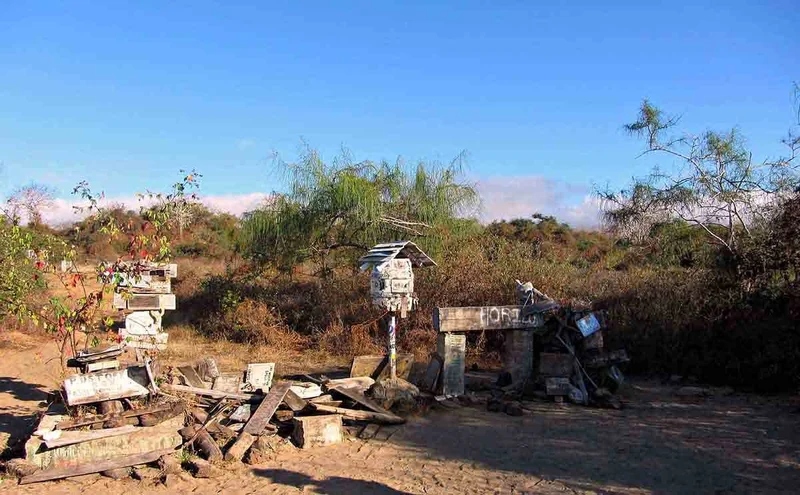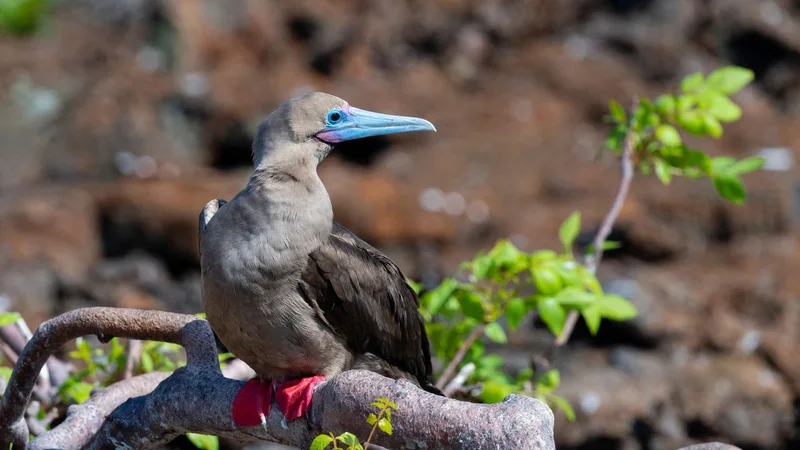
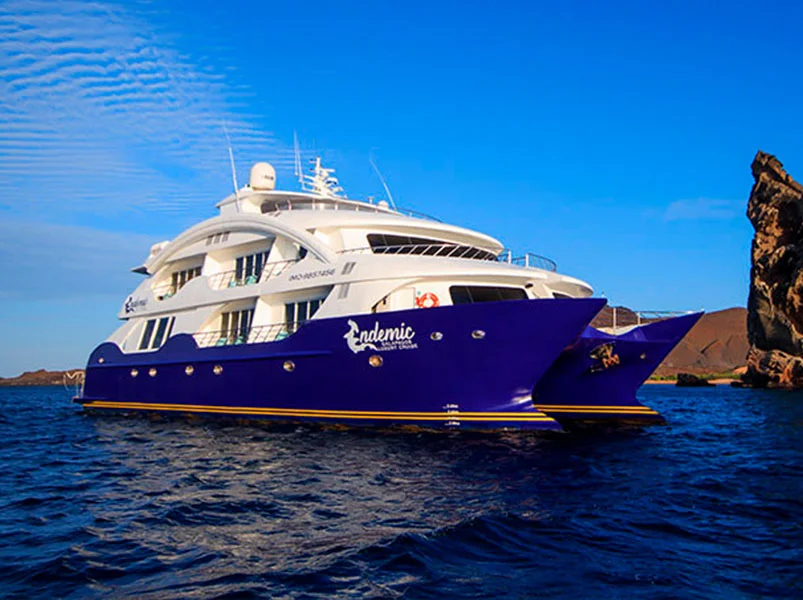
The M/C Endemic Itinerary B 7-Night Cruise is a great way to experience the natural beauty and wildlife of the Galapagos Islands. The cruise visits 7 islands in the archipelago, offering a variety of activities, such as snorkeling, hiking, and wildlife viewing. You will have the opportunity to see a wide variety of animals, including penguins, sea lions, iguanas, flamingos, and many more. This is a great way to learn about the unique ecosystem of the Galapagos Islands and to experience the beauty of these islands firsthand.
The cruise is 7 nights long and departs from Baltra Airport. The itinerary is subject to change due to weather conditions, National Park regulations, emergencies on board, or any unforeseen situation.
8 Day Galapagos Itinerary
Day 1: Baltra Island & Santa Cruz: Dragon Hill
Upon arrival, reception and assistance at the airport, transfer from Baltra Airport to the M/C Endemic .
Santa Cruz: Dragon Hill
In the afternoon, visit to Dragon Hill will take place, which is located in the north-western part of Santa Cruz island. Here you will have the opportunity to walk into the island and view the land iguana. Be among these magnificent reptiles, that just a few decades ago were on the brink of extinction.
Moreover, at Dragon Hill you will see a flamingos’ lagoon, pintail ducks and other endemic birds including flycatchers and warblers. After a short trek, amazing view awaits us up the hill. Offshore snorkeling before returning to the yacht.
Day 2: San Cristobal: Kicker Rock, Witch Hill & Lobos Island
Kicker Rock
In the morning, the first spot to be visited is Kicker Rock, an impressive geological formation due to erosion. This is a nesting place of sea birds. Additionally, curious sea lions, and marine life can be found, such as fish, turtles, sharks, rays, representing the main attraction for snorkeling. This is a nice spot to take pictures .
Witch Hill
The next attraction to see is Witch Hill, a tuff cone hill located south west from San Cristobal. This name comes from the Spanish name of the bird known in English as Vermilion Flycatcher.
A zodiac ride will take passengers into amazing rock formations along the island shore. A white sand beach and crystal-clear waters are part of this enchanted location. Fantastic opportunity for snorkeling.
Lobos Island
In the afternoon, you will be taken to Lobos Island, where a small population of blue-footed boobies, frigates, marine iguanas, and great frigate birds nesting can be observed. Snorkeling with sea lions in this calm bay is also part of the excursion.
Day 3: Española Island: Gardner Bay & Suarez Point
Española Island will be explored today. You will have the chance to observe endemic wildlife such as the Hood-Mockingbird. This is the southernmost island in the Galapagos archipelago, and home to several wildlife species, including masked and blue-footed boobies. Spectacular views from the top of a cliff .
Gardner Bay
In the morning, after breakfast, the first attraction to be seen is Gardner Bay that provides an excellent beach for swimming. Around the small islets nearby, snorkelers will find lots of fish and sometimes turtles and sharks. The bay is also frequented by colonies of sea lions which like to swim with you.
Or visit the Osborn and Gardner islets that are amazing for underwater discovery. Snorkeling is a highlight on this visitor point.
Suarez Point
After lunch, Point Suarez will be visited, which represents one of the most outstanding wildlife areas of the archipelago, with a long list of species found along its cliffs and sand or pebble beach.
Day 4: Santa Fe Island & Santa Cruz Island: Fausto Llerena Breeding Center
Santa Fe island
In the morning, after breakfast, Santa Fe island will be visited, which is one of the most entertaining destinations for shore excursions in the Galapagos Islands. It has two trail choices for visitors, one of which takes you to the tallest Opuntia cactus in the Galapagos. While the other trail takes you into the highlands where land iguanas can be seen. After a long walk, the opportunity to swim in calm waters or snorkel with playful sea lions will be pretty tempting.
Santa Cruz Island: Fausto Llerena Breeding Center
In the afternoon, visit the Fausto Llerena Breeding Center, which is also known as Charles Darwin Research Station. This place has an information center, a museum, a library and a tortoise breeding station. In the tortoise breeding station, you can encounter tortoises of different subspecies, which are prepared for reintroduction to their natural habitats. The most popular inhabitant of this Station is probably the Lonesome George turtle, that already died in 2012.
Day 5: South Plaza Island & Bartolome Island
South Plazas Island
In the morning, South Plazas Island is the next island to be discovered. It has unique Sesuvium plants and Opuntia cactuses scattered across the landscape which provide some of the most interesting wildlife observations available in Galapagos .
Land iguanas are easily seen from the trail, frequently under the shade of cactuses, waiting for a prickly pear to fall.
Bartolome Island
After lunch, you will discover Bartolome Island. Once here, you will ascend to admire the spectacular panorama of the Sullivan Bay and the famous Pinnacle Rock. The beaches at the foot of the Pinnacle Rock are excellent for snorkeling from which you can discover the marvelous underwater world, and with a little luck, you’ll get to snorkel with penguins.
Day 6: Floreana Island: Devil´s Crown, Cormorant Point & Post Office Bay
Devil´s Crown
In the morning, after breakfast, the first spot to be visited is Devil´s Crown that is an underwater volcanic crater, almost covered completely by Galapagos waters . Just a small portion of the rock formation can be seen from above and it looks like a crown. The underwater world is very rich in coral reefs, abundant marine species. Birds are also part of this visitor point due to its location in open waters.
Cormorant Point
Or visit Cormorant Point where you will land on a green olivine sand beach. Following a 100 meters long path you will soon reach a lagoon with flamingos.
In the afternoon, you will visit the Baroness’ Lookout (Mirador de la Baronesa). This viewpoint is located on the north of Floreana Island. The way up and trail is very easy, steps are placed in this area for security. Your naturalist guide will tell the murder and mystery legend of the Baroness.
Post Office Bay
Or you will go to the Post Office Bay, which keeps the legendary post barrel that whalers historically used to post their mail in.
Day 7: Chinese Hat Islet & North Seymour Island
Chinese Hat Islet
In the morning, after breakfast you will visit Chinese Hat, which is a small islet off the south coast of Santiago, with a maximum elevation of 160 feet (52 meters).Though within easy reach of Santa Cruz, Chinese Hat is typically only visited by those aboard a Galapagos Cruise.
North Seymour Island
In the afternoon, North Seymour island will be discovered. It is located slightly to the north of Baltra. It is a low, flat island, formed by submarine lava formation uplift. Covered with low, bushy vegetation, it contains the largest colony of magnificent frigate birds in the Galapagos. There is also a large population of blue-footed boobies that perform an amusing courtship dance when nesting conditions are right.
Day 8: Santa Cruz Island: Black Turtle Cove & Baltra Airport
Santa Cruz Island: Black Turtle Cove
After breakfast, enjoy the visit to Black Turtle Cove, which is located on the north shore of Santa Cruz . It is a living illustration of how mangroves alter the marine environment to create a rich and unique habitat. Three mangrove species crowd the area from the shore out into the lagoon, which reaches almost a mile inland.
As you drift through quiet waters in the zodiac, you are likely to see spotted eagle rays and diamond shaped mustard rays, which swim in a diamond formation. White-tipped reef sharks slip beneath the boat and Pacific green sea turtles come to the surface for air and to mate. Waterfowl, including pelicans, herons and egret, all feed in the cove. This is a peaceful place that will make you feel calm.
After this last visit, transfer to Baltra airport for your return flight to mainland Ecuador.
Assistance and farewell at the airport.
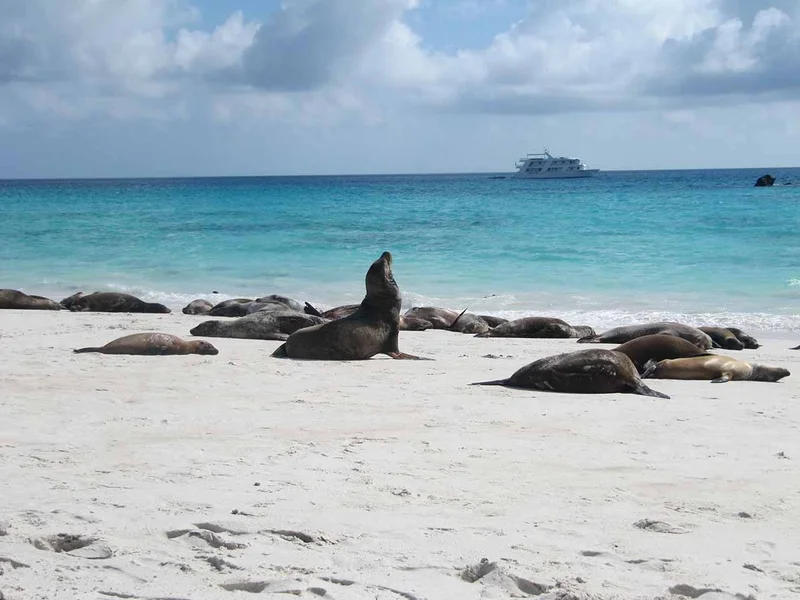
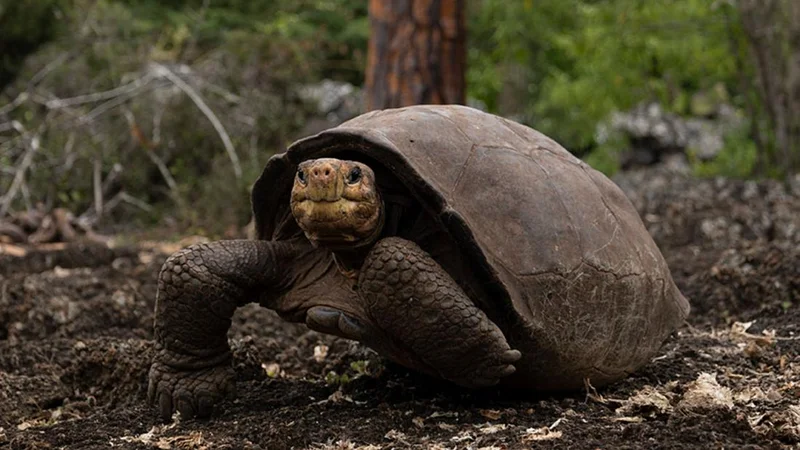
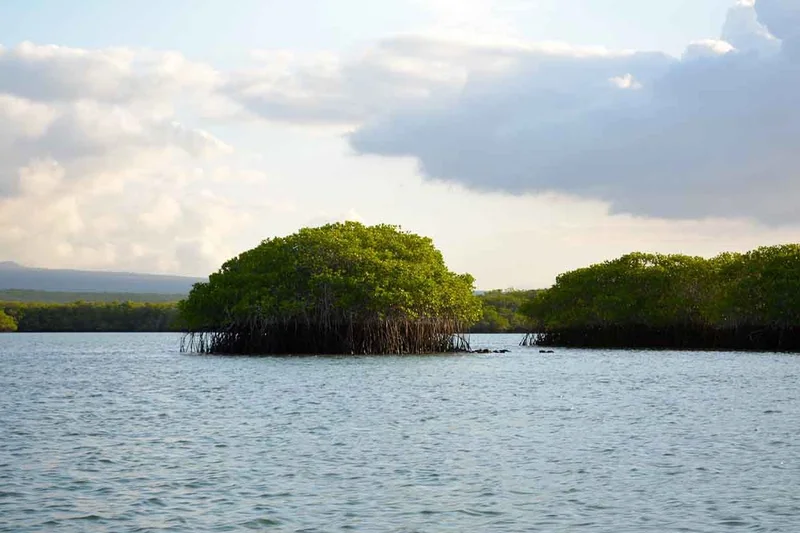
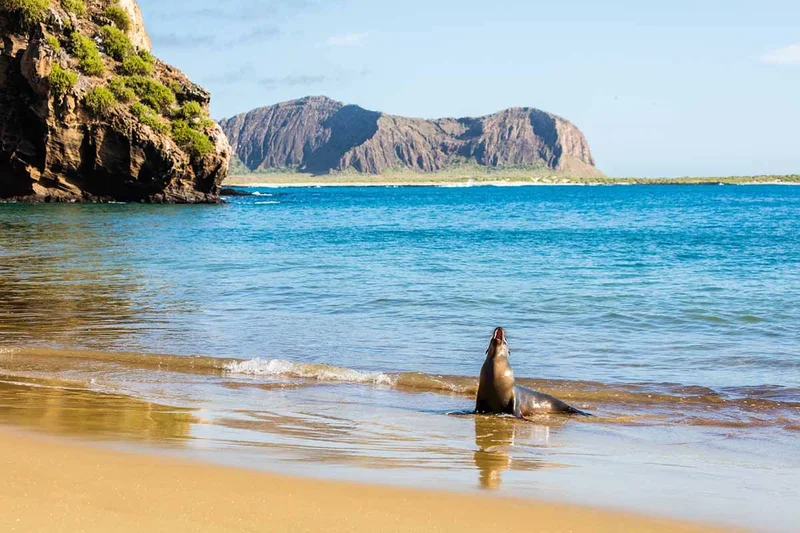
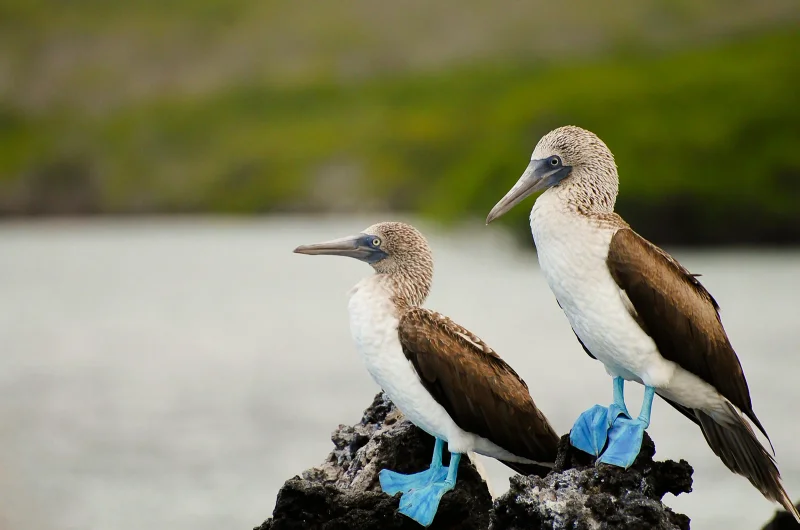
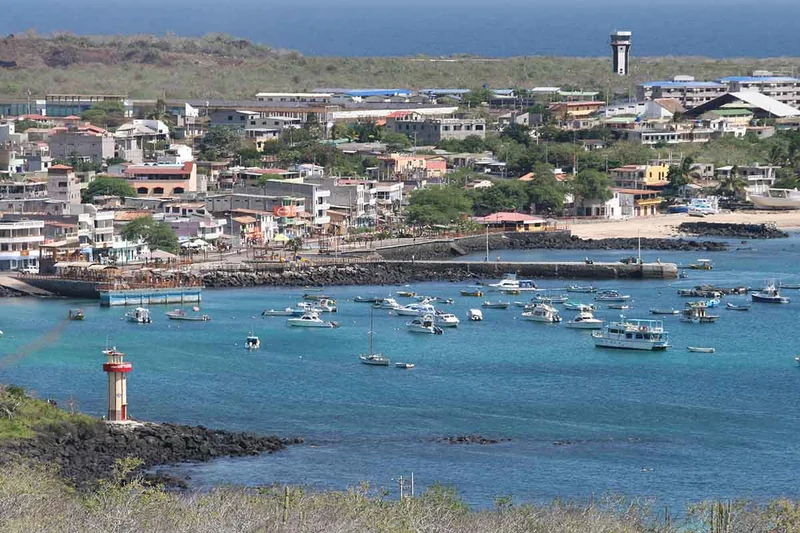
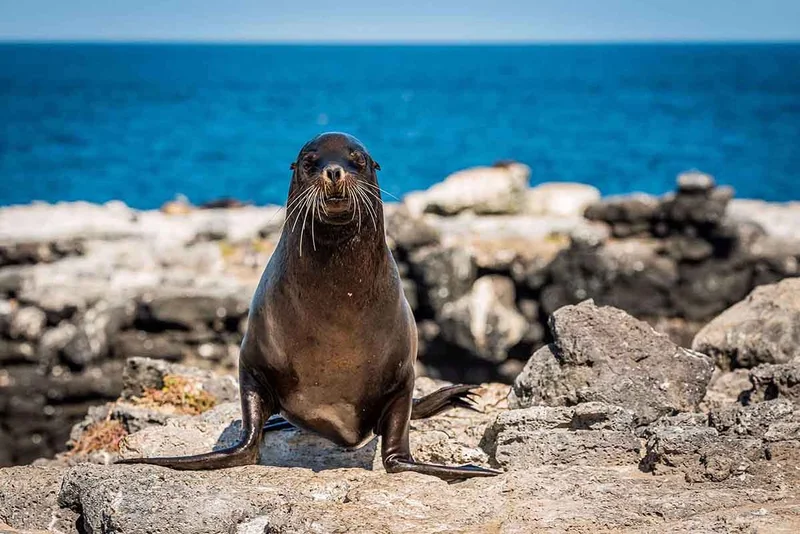
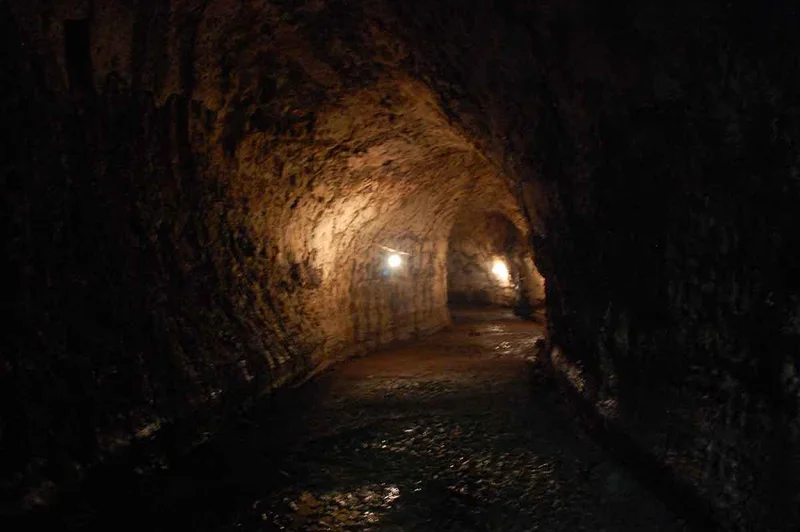
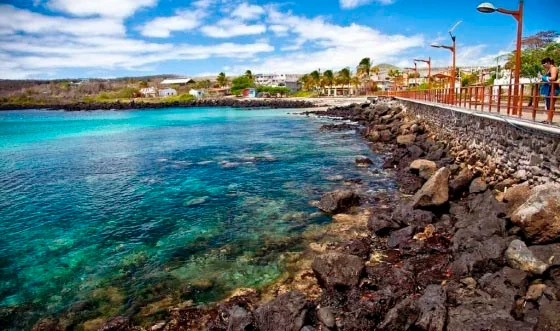
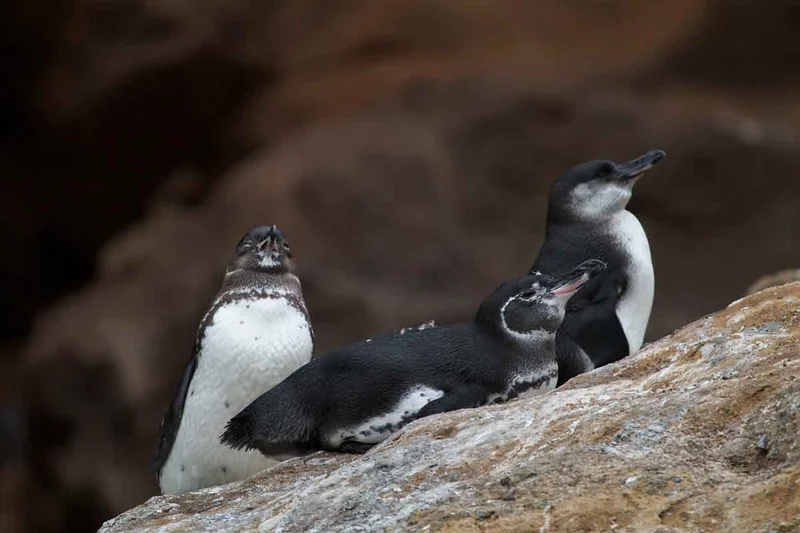
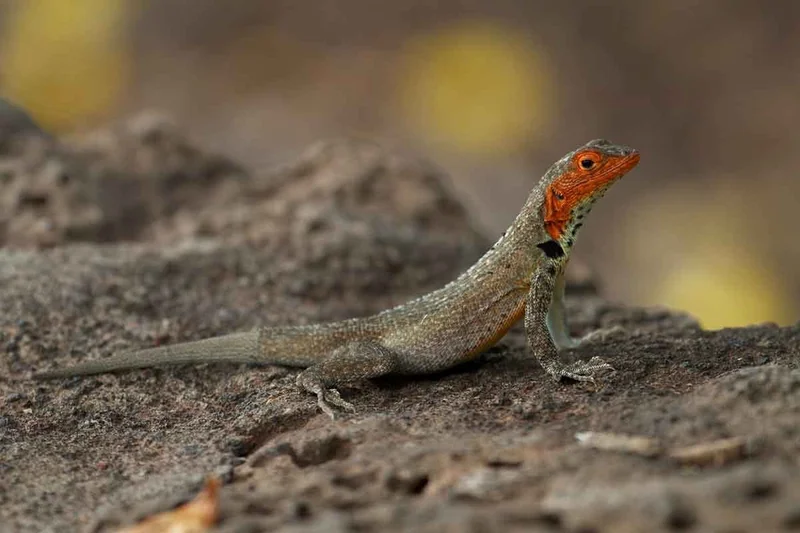
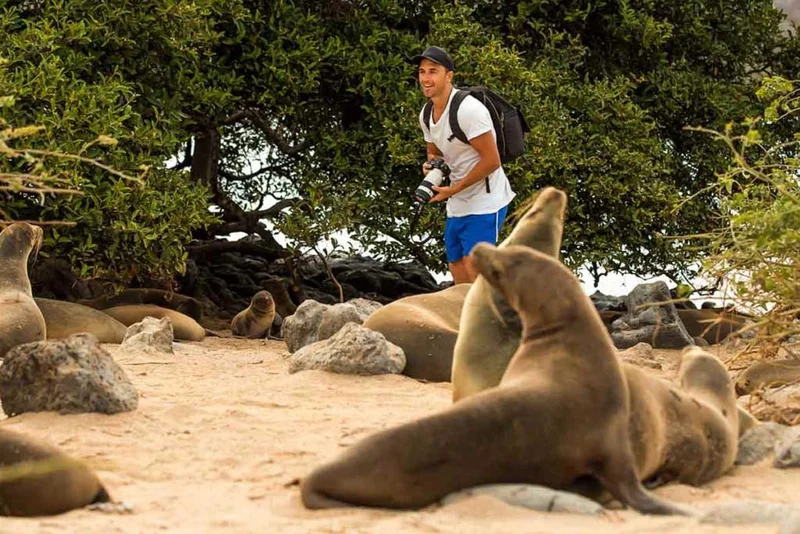
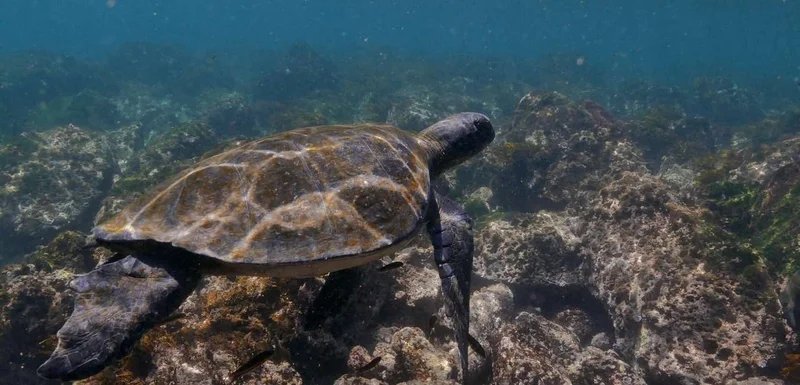
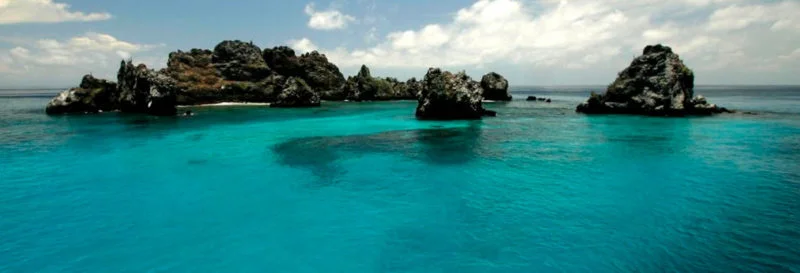
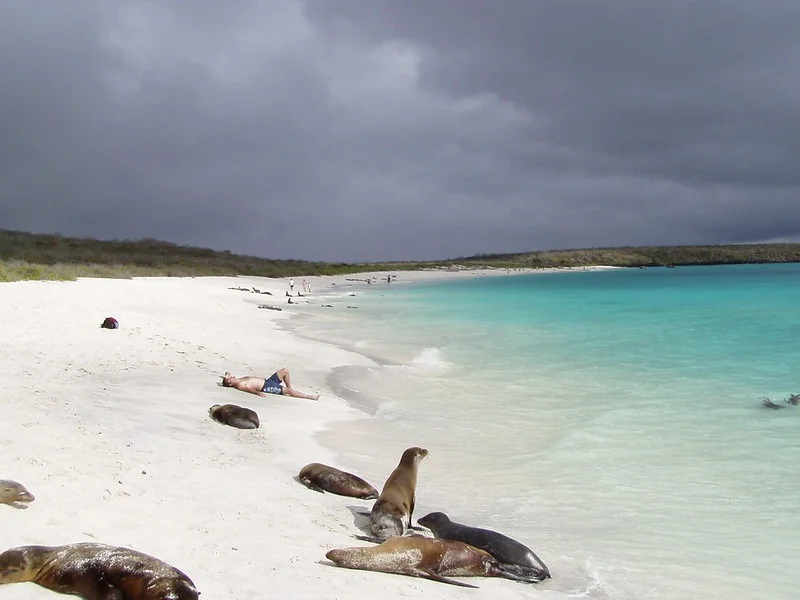
8 Day Galapagos Itinerary Includes
- Transfers airport/yacht/airport in Galapagos
- Airport reception and assistance
- Double or single accommodation
- Guided expeditions according to the itinerary
- Top bilingual National Park guide (English / Spanish)
- Cruise Service Officer
- Activity daily briefing
- All meals and snacks
- Soft drinks and juices
- Captain’s welcome and farewell cocktail
- Supplied expedition gear
8 Day Galapagos Itinerary Does not Include
- Round trip to Galapagos
- Galapagos National Park Entrance fee ($200 – subject to change)
- Transit Control Card ($20 – subject to change)
- Alcoholic and bottled beverages
- Gratuities for guide and crew
- Travel and health insurance
- Micro SD Card
8 Day Galapagos Itinerary Highlights
- Snorkel, see sea turtles, rays, and sharks.
- Visit the Fausto Llerena Breeding Center on Santa Cruz Island to learn about tortoise conservation.
- Land iguanas, flamingos, sea turtles, sharks, and fish.
Itinerary Map
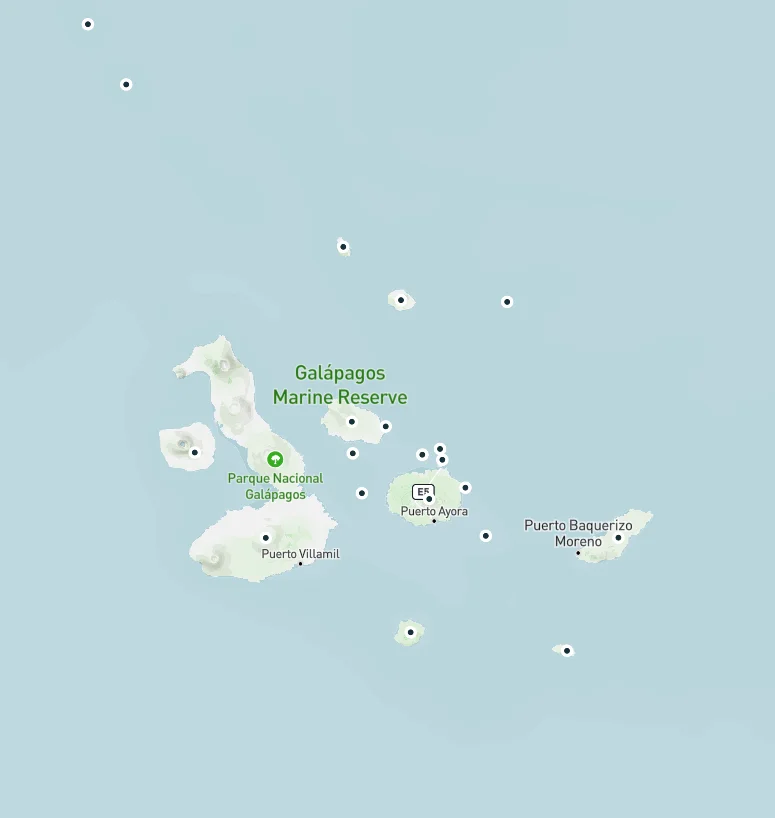
Dates & Promotions
Dates |
|---|
No data |
Reviews
Animals you might see on this itinerary:
More information about the Galapagos Islands you visit in this 8 day itinerary:
Galapagos 8 day southern islands cruise on board the Endemic
Why travel with us?
Similar Itineraries
